Here are the great bike links from around the world that caught our eyes this week:
Automatic lifesaving: Street-scanning, self-braking technology is already saving lives. So why isn’t it required in every car yet?
Handlebar cam: The Fly12 is a combination headlight/video camera.
The other drug war: Colorado’s governor wants to make someone’s fourth drunk-driving offense a felony, but some state officials worry that all that jail time would cost too much.
Flashy bike: A British cop has brought this memorable customized bike with him from post to post over the years.
Bike tunnel: It snowed a lot in Boston last week:
There's so much snow piled up at #MBTA Wellington that there's snow tunnel a biker can clear! (via @BostonBikeParty) pic.twitter.com/lTkm1QD98n
— Only In Boston (@OnlyInBOS) February 19, 2015
Icy riding: Next year, the Twin Cities will be the first U.S. city to host the International Winter Cycling Conference.
Designs for speed: Why do wider auto lanes decrease safety? Because according to the Transportation Research Board, “drivers’ primary basis for estimating their speed is the visual sensation provided by the highway geometrics.”
Advertisement
Local control: In the UK, there’s a rising movement to devolve more political power to city and metro-area governments.
Lane switch: A soon-to-be parking-protected bike lane will Bay Area city Alameda “our first complete street.”
Armstrong perjury: Lance’s new $10 million penalty for lying under oath about his use of performance drugs is “believed to be the largest such sanction against an individual in American judicial history.”
Bike holiday: Presidents’ Day, founded at the start of the 1880s bike boom, started its life largely as a holiday to enjoy bicycling.
Public space: Why exactly did we illegalize having parties in the street? asks Angie Schmitt.
Reconnected college: With 850 students, staff and faculty near the west landing of the Ross Island Bridge, the Northwest College of Natural Medicine has been trapped for decades on a big traffic island. NCNM is hoping that a rail or rapid bus line down Naito will tie it to the rest of South Portland.
Steely White style: When New York City’s top bike advocate races, he wears the kit of “an Icelandic yogurt company.”
Just do it: “We are our own heroes,” said Oboi Reed of Slow Roll Chicago in one of a series of short keynotes from last weekend’s Youth Bike Summit in Seattle. “Nobody’s coming to save the day except for us.”
If you come across a noteworthy bicycle story, send it in via email, Tweet @bikeportland, or whatever else and we’ll consider adding it to next Monday’s roundup.

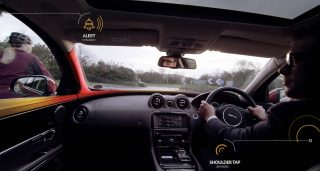
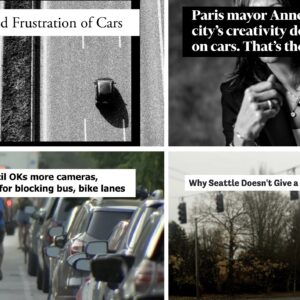
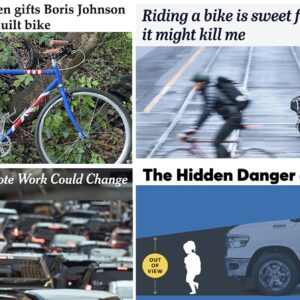
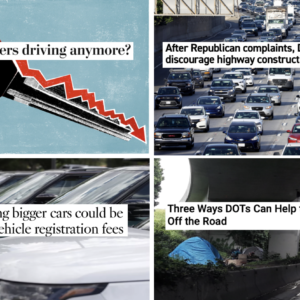
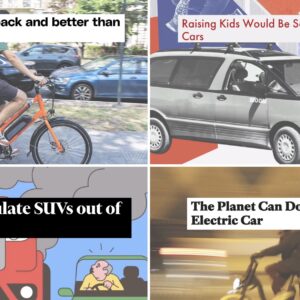
Did you see that Ed Begley Jr. rode his bike to the Oscars? In the rain, no less? 🙂 https://twitter.com/RMGNews/status/569696876015935488 I asked him via twitter about how the bike parking was, and they had to put it in an office somewhere for him.
Making cars smarter so drivers can continue to get dumber.
Or surf the web so Google can make more money.
Making cars smarter to help avoid collisions with people biking that refuse to become smart enough to safely ride on the street with motor vehicles.
On the road, many people biking, all vulnerable road users of course, (as opposed to people driving that relatively speaking, aren’t vulnerable road users.) decline to make adequate lane changes, hand signal direction changes and stops, and stop for stop signs and stop lights. And on and on, including declining to refrain from making phone calls and texting while riding in traffic. Smarter cars may help people driving, avoid some of the vulnerable road user accidents waiting to happen on a bike. Seems likely that most people would consider this a good thing.
“Making cars smarter to help avoid collisions with people biking that refuse to become smart enough to safely ride on the street with motor vehicles.”
Do you really believe that, wsbob? I really don’t get your penchant for always redirecting the conversation about dangers to people on bikes from cars – to the people biking.
“many people biking,[…] decline to make adequate lane changes, hand signal direction changes and stops, and stop for stop signs and stop lights. And on and on, including declining to refrain from making phone calls and texting while riding in traffic.”
Do you have any evidence that any of those infractions you enumerate are implicated in the (actual rather than hypothetical) injuries and deaths by people on bikes? Because I have my doubts.
Lester’s wiseacre remark invited some counterpoint. I don’t think there’s any question though, that people riding bikes amongst or alongside motor vehicle traffic, are the relatively vulnerable road users. And that as vulnerable road users, many of them for various reasons, are not using basic road use procedures to help improve their safety while riding with motor vehicles. Smarter motor vehicles may help save some of the people biking badly, from collisions with motor vehicles.
I understand that a number of people commenting to bikeportland, think that every mention of how people drive, is an occasion for a gut busting big joke. Pinhead jokes like Lester made about people driving, aren’t funny on a bike weblog that aspires to be seriously dedicated to improving conditions for biking. In certain bars, drunk, sure, tell all the stupid, insulting, obnoxious jokes you want, and laugh your head off. Told here, that kind of thing is counterproductive, and alienates people from each other.
“And that as vulnerable road users, many of them for various reasons, are not using basic road use procedures to help improve their safety ”
This is the part I am not following. This sounds like idle speculation on your part: you and your buddies have noticed people biking don’t all wear dayglo, or sometimes treat stop signs as yields, and you then conjecture that (a) these behaviors are the norm, and (b) because we know that people on bikes get injured, doored, run into, and sometimes killed by people piloting motor vehicles that what is noteworthy is that it must have been their behavior that brought this about, that made their movements unpredictable to those in cars.
FWIW, I thought Lester’s remark absolutely on point. Not just accurate but brilliant. It takes us back to the responsibility thing you and I love to debate here on bikeportland. I think it is uncontroversial that when a piece of hardware is made ‘smarter’ the operator of that piece of hardware will be assigned proportionately less responsibility, have less say-so about how the task is accomplished. The operator’s skill set atrophies, is made redundant. This is true for washing machines, on board diagnostics in automobiles, machine tools, etc.
“I don’t think there’s any question though, that people riding bikes amongst or alongside motor vehicle traffic, are the relatively vulnerable road users.”
I agree. But you perplexingly skip right over the reason most of us think they are vulnerable. Notice how their vulnerability all but disappears once the ‘alongside motor vehicle traffic’ part is dropped.
This still puts the onus on bike riders. We lack training, or something. OK, in 20 years of riding in Portland, I’ve had three car-bike collisions. In every case I was riding legally in the best place available on the street. (Perhaps I misjudged the doorspan of that VW Beetle by a couple inches.)
The most recent colision happened when a malignant Subaru entered my space while I was stopped at a light! The owner of the Subaru was contrite and paid for a new rear wheel. If only that wagon were better trained!
It’s disingenuous and naive to put the onus on road safety entirely on the vulnerable road users. That’s not the segment of the road-using public that is creating the danger.
The onus and responsibility for road safety should be apportioned based on the level of danger a mode brings to the road– which means motor vehicle drivers should have the greatest onus and responsibility, followed by non-motor vehicle drivers (bike riders) and then by non-vehicle (pedestrians). Essentially, take the transportation hierarchy triangle and flip it over to come up with a transportation responsibility hierarchy triangle.
This idea supposes that while all road users have responsibility for the safety of the roads, some road users are more responsible for it than others.
There’s a link within the BikeSnob snow-riding post to a Russian video of a crow that likes to ride on one guy’s handlebars. It’s absolutely charming. There are so many crows in Portland these days, we could all have “cockpit crows”! https://www.youtube.com/watch?v=LAAg2OQMf1o
Not a fan of that sailor photo.
http://www.motherjones.com/mixed-media/2012/10/unromantic-truth-vj-kiss-photo
Consider the source link…Mother Jones.
Confusing comment Lester, because the photo existed 30 years before that magazine did.
Good point. Schmitt’s piece gave me the idea of including it, but in her post it’s amid some other examples. No strong reason to depart from our usual one-image-per-roundup format.
That SW Portland college that wants to vacate dead-end streets is concerning. Generally vacating streets doesn’t help to make 20 minute neighborhoods and thru-street access for pedestrians.
The handlebar cam is cool, but at nearly $400, I would rather get a Mobius for about $100 with waterproog case.
Perhaps the word you were groping for was “criminalize” rather than “illegalize”.